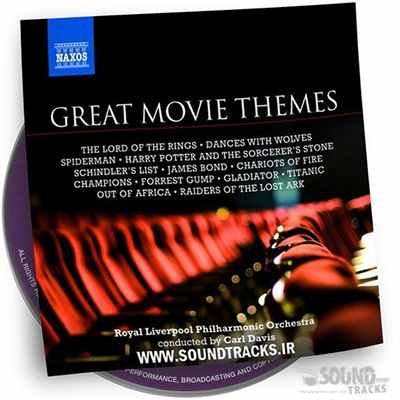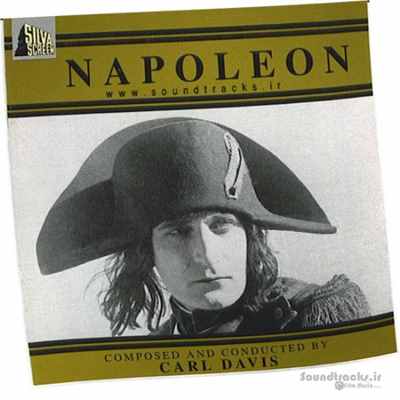دانلود برترین تم های فیلم های سینمایی با رهبری کارل دیویس و اجرای ارکستر فیلارمونیک رویال لیورپول
Carl Davis & Royal Liverpool Philharmonic Orchestra - Great Movie Themes

Royal Liverpool Philharmonic Orchestra - Carl Davis - Great Movie Themes
Orchestra: Royal Liverpool Philharmonic Orchestra | Conductor: Carl Davis | Album: Great Movie Themes
Style: Classical, Soundtrack, Score| Year: 2007 | Format, Bitrate: FLAC Lossless / MP3 320 kbps
Size: 371/182/82 MB | Recovery: 3% | Covers: in archive | Label: EU / Naxos
Great Movie Themes
Music has been central to films from their earliest days ('silent' cinema is very much a misnomer) and has been used to underline mood, or stoke or suppress excitement. Later, film companies saw that they could make more money by releasing recordings of the music, some of which became popular and even developed a life of its own outside the films. So it is with this selection, which includes a variety of popular themes, block-busters and Oscar-winners.
With 45 nominations and five wins (and no prospect of the stream drying up) composer John Williams is the most Oscar-nominated person alive. His 1981 nomination was for Steven Spielberg's Raiders of the Lost Ark.A homage to Saturday serials, it is set in Egypt in 1936 where archaeologist Indiana Jones battles with Nazis for the Ark of the Covenant. Williams wrote an extensive score for the film and this selection uses the Raider's March to bookend the theme of Marion, Indy's old flame.
John Barry Prendergast – he dropped his last name – was born in 1933, the son of a Yorkshire cinema-owner. In the early 1960s, after a successful pop career, he moved into cinema, working on dozens of films in many genres, though he is probably best-known for his James Bond scores. For Out of Africa (1985) director Sidney Pollock wanted the music to tell most of the story of author Karen Blixen's life in Africa. Barry won the third of his four Oscars for the lush score, whose full-throated romantic main theme has a tender introduction.
Danny Elfman, born in 1956, was a composer and multi-instrumentalist in his brother Richard's performance art / new-wave rock band The Mystic Knights of Oinga Boinga (progressive shortenings of the name left only the last word before dissolution in 1995). One of his biggest influences is Bernard Herrmann, as reflected in the driving rhythms and dark, glittering orchestration of Spider-Man (2002). Elfman has scored several comic-book adaptations and sees Spider-Man as an "American" score, in contrast to the more Prokofiev-like Batman (1989). For this concert piece, the Main Title leads into a ghostly Farewell before a brief restatement of the main title.
John Williams' Oscar for Spielberg's Schindler's List (1993) was just one of the seven that the film picked up. Based on Thomas Keneally's docu-novel Schindler's Ark, it told of a Czech factory owner who, by various subterfuges, set out to save many of his Jewish workers from Auschwitz. But Schindler is a complex character: he starts the war by frankly exploiting his Jewish workforce, and never relinquishes his drinking and womanising. Keneally's book was subsequently republished under the film's title (ironically, in German 'list' also means 'cunning'). Williams' gently rocking and appropriately Jewish-sounding lullaby-like theme is in the form of a miniature violin concerto and was played on the film soundtrack by its dedicatee, the Israeli violinist Itzakh Perlman. Time constraints, however, meant that the trailer used Wojciech Kilar's Exodus, causing an upsurge in interest in that piece. It was recorded on Naxos 8.554788.
In scoring Ridley Scott's Gladiator (2000) Hans Zimmer avoided a 'Roman' feel or music like Alex North's forSpartacus (1960), though many people encouraged him in that direction. He would undercut expectations by using the 'anti-action' form of the waltz: "My Rome is Viennese waltzes turned upside down and made savage and barbaric." He consciously evokes Mars from Holst's The Planets (the middle section rather than the famous rhythm) and Siegfried's Funeral March, paralleling the way that Scott draws on the films of Nazi propagandist Leni Riefenstahl. After a brief statement of the mysterious Barbarian Horde comes the Holstian Battle, slowing to the gentler string-led Earth but this is swept aside by a longer statement of The Barbarian Horde.
Carl Davis (born 1936) has been enormously prolific in both cinema and television and is one of the foremost composers of new scores for silent films. Champions (1984) is the true story of the jockey Bob Champion, who was diagnosed with cancer in 1979 but recovered and won the 1981 Grand National on Aldaniti. Champions Theme and Grand National, recorded here by the composer, capture the galloping exhilaration of the event and, appropriately, have occasionally been used since as the theme music for broadcasts of the race.
Howard Shore (born 1946) worked in pop music and television before making a name in film music in collaborations with fellow Canadian, director David Cronenberg. Shore spent over three years working on Peter Jackson's The Lord of the Rings, discussing his long-hand sketches with the director for over a year before shooting began. Shore regards several of his film scores as operatic (he specifically cites Silence of the Lambs(1991) and Looking for Richard (1996), and his operatic version of Cronenberg's 1986 film The Fly will have its première in Paris in 2008.) He regards The Lord of the Rings trilogy as a three-act opera, though he has adapted it into a six-movement symphony. The Symphonic Suite from the films' middle panel, The Two Towers, incorporates seven of the trilogy's fifty-plus motifs including instrumental versions of some of the songs.
The British film industry has long had its ups and downs. When Hugh Hudson's Chariots of Fire (1981) won Best Film, Screenplay and Music Oscars, writer Colin Welland famously cried: "The British are coming!", though that was perhaps overstating the case. The film tells the true story of two runners, a Christian and a Jew, who overcome bigotry and face difficult moral decisions in preparing for the 1924 Olympics. The music by Greek composer Vangelis (born 1943) spawned a hit single and the image of the athletes training on the beach at dawn accompanied by the obsessive music exemplified the story and became a target for many tributes and parodies. Oddly, for a film set in 1924, the original soundtrack was entirely electronic though it was later arranged for orchestra.
Monty Norman was a successful composer but his 1961 show The Ballad of Dr Crippen was critically panned. Nevertheless Cubby Broccoli, one of its backers, invited Norman to score the new film he was producing, Dr No.For the main theme Norman remembered the song Bad Sign Good Sign from his unstaged musical based on VS Naipaul's A House for Mr Biswas, which began: "I was born with this unlucky sneeze and what is worse I came into the world the wrong way round." With the rhythm slightly tweaked Norman presented it, and John Barry arranged it. Led to believe that he was only working on the main title, Barry was shocked to see that the arrangement was "plastered all over the film". But he was assured that his contribution had been recognized and he went on to score eleven more Bond films, creating the sound that is inseparable from the series.
With a ballooning budget and terrible overruns, there were dire predictions that the most expensive film ever made could not turn a profit. But Titanic (1997) went on to triumph, becoming the highest grossing film of all time. Director James Cameron wanted Enya to write the music but when she refused he turned to James Horner (born 1953). Coincidentally Horner saw Enya's Gaelic new-age sound as an appropriate model for his own score. Cameron did not want to use a title song but Horner secretly recorded My Heart Will Go On with Celine Dion, and presented it to Cameron, who changed his mind. The short suite follows the plot, from Rose's memories, through the departure from Southampton, to the sinking and, after the famous song, a short epilogue.
Robert Zemeckis' Forrest Gump (1994) shows recent American history through the eyes of an extremely good-hearted man with a low IQ. Computer animation allowed star Tom Hanks to meet people including Kennedy, Nixon and John Lennon, and to take part in the Vietnam War. But Gump is unaware of the importance of these events or of his sometimes profound influence on history. In keeping with the story, the music by Alan Silvestri (born 1950) has a feeling of homespun Americana.
Dances with Wolves (1990) was a controversial project, as Kevin Costner, though an established actor and star of the film, was to make his directing debut with a very long Western at a time when the genre was out of favour and, viewing Indian culture sympathetically, it would have several scenes in the Sioux's Lakota language. Civil war Lieutenant John Dunbar joins a Sioux tribe and takes the name Dances with Wolves but as the US army approaches he has to decide on which side he will stand. In the event the film was very successful and Costner's director's cut added nearly an hour to the original three-hour running time. John Barry won his fourth Oscar for the score, with its elegiac evocation of the old West.
J. K. Rowling's seven Harry Potter books have been a publishing phenomenon and film versions naturally followed. Using the American title of the book, Harry Potter and the Sorcerer's Stone (2001) was the first, and the series is planned to end in 2010. John Williams wrote the music for the first three but, though Patrick Doyle and Nicholas Hooper took over for the fourth and fifth instalments, they still used the main themes. It remains to be seen who will score the last two episodes. Harry's Wondrous World is a suite from the first film. With its easy flying grace and glittering gamelan-like percussion, it quickly conjures the world of Hogwarts' apprentice sorcerer.
John Riley
Track List:
01. Raiders of the Lost Ark (5:42)
02. Out of Africa (3:53)
03. Spider-Man (5:08)
04. Schindler's List (4:24)
05. Gladiator (6:29)
06. Champions - Theme (3:07)
07. Champions - Grand National (2:17)
08. The Lord of the Rings: The Two Towers - Suite (8:25)
09. Chariots of Fire (3:29)
10. James Bond: Doctor No - Theme (3:24)
11. Titanic (8:17)
12. Forrest Gump (6:02)
13. Dances With Wolves (4:07)
14. Harry Potter and the Sorcerer's Stone: Harry's Wondrous World - Suite (4:40)






